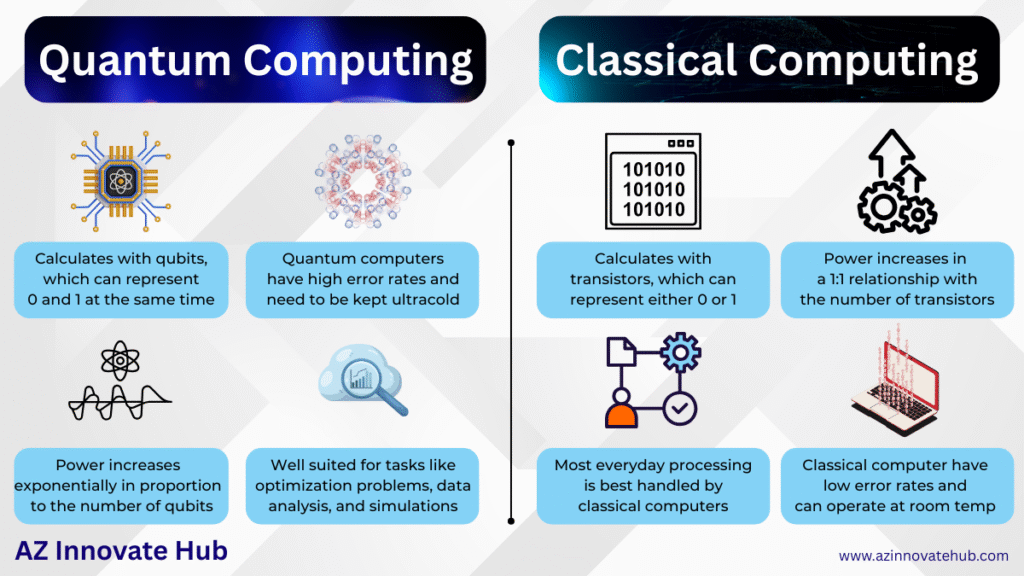
Key Insights to Quantum Computing
- Quantum vs Classical: Classical computers use bits (0 or 1), while quantum computers use qubits that can be 0 and 1 simultaneously through superposition
- Core Principles: Superposition and entanglement enable quantum computers to process multiple possibilities at once
- Real Applications: IBM partnerships in pharmaceuticals, Google’s quantum supremacy, financial optimization trials
- Current Challenges: Decoherence, scaling limitations, and high costs remain significant hurdles
- Future Impact: Will complement classical computers for specialized problems like drug discovery and cryptography
Introduction: What is Quantum Computing?
Imaging trying to solve a maze by testing every possible path simultaneously, instead of one route at a time. This fundamental difference captures the essence of quantum computing—a revolutionary approach that leverages quantum mechanical phenomena to process information in ways impossible for classical computers.
Unlike traditional computers that process information sequentially using bits that are either 0 or 1, quantum computers use quantum bits (qubits) that can exist in multiple states simultaneously. This capability, called superposition, combined with quantum entanglement, allows quantum systems to explore vast solution spaces in parallel.
Major technology companies including IBM, Google, and Microsoft have invested billions in quantum research, while governments worldwide recognize quantum computing as critical for national competitiveness. This isn’t merely faster computing—it’s an entirely new computational paradigm that promise to transform industries from healthcare to finance.
What Makes Quantum Computing Different?

Quantum computers vs. Classical Computers
Classical computing has powered our digital revolution through the manipulation of bits—simple switches that represent either 0 or 1. Every smartphone, laptop, and supercomputer operates on this binary foundation, processing information through logical operations performed sequentially.
Quantum computing operates on fundamentally different principles borrowed from quantum mechanics. Instead of bits, quantum computers use qubits that can exist in superposition—simultaneously representing 0, 1, or any combination of both states. This isn’t just theoretical; it’s a measurable quantum phenomenon that enables parallel processing impossible in classical systems.
The scale of this difference becomes apparent when considering information capacity; While 300 classical bit can represent exactly 300 pieces of information, 300 qubits in superposition can represent 2^300 possible states—more than the number of atoms in the observable universe. This exponential scaling underlies quantum computing’s potential for solving specific types of problems.
Core Quantum Principles: Understanding Qubits Superposition Entanglement

Superposition: Multiple States Simultaneously
Superposition allows qubits to exist in combinations of 0 and 1 states simultaneously, like a coin spinning in the air that’s both heads and tails until it lands. This principle enables quantum computer to explore multiple solution paths at once rather than testing possibilities sequentially.
Google’s Sycamore processor demonstrated this power in 2019 by solving a specific mathematical problem in 200 seconds that would require the world’s fastest classical supercomputer approximately 10,000 years to complete. This achievement, termed “quantum supremacy,” showcased superposition’s practical potential.
Entanglement: Quantum Connections
Entanglement creates mysterious correlations between qubits that persist regardless of physical distance. When qubits becomes entangled, measuring one instantly determines the state of its partner—what Einstein called “spooky action at a distance.”
This phenomenon enables quantum computers to coordinate complex calculations across multiple qubits in ways impossible for classical systems. Entanglement allows quantum algorithms to create interference patterns that amplify correct solutions while canceling incorrect ones.
Quantum Interference
Quantum interference works like noise-cancelling headphones, eliminating unwanted possibilities while amplifying desired outcomes. Quantum algorithms exploit interference patterns to guide computations toward accurate solutions, enabling the remarkable efficiency that characterizes quantum computing for specific problem types.
How Quantum Computers Work
Modern quantum computers require extraordinary environmental control to maintain delicate quantum states. Most systems operate at temperatures near absolute zero (-273⁰C), colder than outer space, using sophisticated dilution refrigerators and electromagnetic shielding to prevent interference.
Different quantum computing approaches use various physical systems to implement qubits:
- Superconducting qubits (IBM, Google): Tiny electrical circuits that become superconducting at ultra-low temperatures
- Trapped ions (IonQ): Individual atoms held by electromagnetic fields and controlled with lasers
- Photonic systems: Use photons as qubits, potentially operating at room temperature.
Quantum computers manipulate qubits through quantum gates—fundamental operations that create superposition, entanglement, and interference. These gates combine into quantum circuits that implement specific algorithms designed to exploit quantum mechanical phenomena.
Real-World Applications: Quantum Computing Applications are Rapidly Expanding
Drug Discovery and Healthcare
Pharmaceutical companies are leveraging quantum computing’s natural ability to simulate molecular interactions. Classical computers struggle with molecules containing more than a few dozen atoms, but quantum systems can model quantum mechanical processes directly.
IBM has established partnerships with pharmaceutical companies including Merck to explore quantum computing applications in drug development. These collaborations focus on using quantum simulation to understand molecular interactions with unprecedented accuracy, potentially accelerating the discovery of new treatments.
The COVID-19 pandemic highlighted the critical importance of rapid drug development. Quantum computing could enable researchers to screen potential compounds against viral targets more effectively, identifying promising candidates for further development faster than classical approaches.
Financial Services
The financial industry has embraced quantum computing for complex optimization problems and risk modeling. Goldman Sachs has demonstrated quantum algorithms for portfolio optimization and option pricing that could solve certain financial calculations exponentially faster than classical methods.
JPMorgan Chase has developed quantum algorithms for credit risk analysis, while other financial institutions are exploring applications in fraud detection and high-frequency trading. The ability to simultaneously analyze multiple scenarios through quantum superposition could enable more sophisticated trading strategies.
Logistics and Optimization
Supply chain optimization presents computationally challenging problems involving millions of variables and constraints. Quantum computers excel at finding optimal solutions to these complex optimization challenges.
Volkswagen has conducted real-world experiments using quantum computers to optimize traffic flow in Beijing and Lisbon. Their quantum traffic optimization system demonstrated measurable improvements in travel times by considering real-time traffic data, weather conditions, and multiple routing variables simultaneously.
Cryptography and Security
Quantum computing presents both opportunities and challenges for cybersecurity. Shor’s algorithm, when implemented on sufficiently powerful quantum computers, could break RSA and elliptic curve cryptography that currently secures internet communications.
This potential threat has motivated development of post-quantum cryptography—encryption methods designed to resist attacks from both classical and quantum computers. The National Institute of Standards and Technology is standardizing quantum-resistant algorithms to prepare for the post-quantum era.
Simultaneously, quantum computing enables new security capabilities through quantum key distribution. China has demonstrated quantum communication networks spanning over 1,000 miles, using quantum entablement to create theoretically unbreakable communications channels.
Current Challenges
Quantum Decoherence
Qubits are extremely fragile and lose their quantum properties within microseconds due to environmental interference. This decoherence represents the most significant challenge facing quantum computing development, limiting the complexity of calculations current systems can perform.
IBM has achieved significant progress extending coherence times through improved qubit designs and better environmental isolation. Their latest quantum processors maintain quantum states for over 100 microseconds—a substantial improvement that enables more complex quantum algorithms
Scalability Issues
Current quantum computers operate with fewer than 1,000 qubits, far short of the millions needed for many practical applications. Each additional qubit increases system complexity exponentially, requiring more sophisticated control systems and better error correction.
Quantum error correction presents particular challenges because it requires hundreds or thousands of physical qubits to create each error-corrected logical qubit. This overhead means practical quantum computers may need millions of physical qubits to perform useful calculations reliably.
Cost and Complexity
Quantum computers cost millions of dollars to build and maintain, requiring specialized facilities and expert technicians. The need for ultra-low temperatures and precise environmental control makes these systems expensive and challenging to operate at scale.
Cloud quantum services from IBM, Amazon, and Google are making quantum computing more accessible by providing remote access to quantum hardware. However, widespread deployment remains limited by cost and complexity constraints.
The Global Quantum Race
The United States launched the National Quantum Initiative in 2018, committing over $1.2 billion in federal funding to maintain leadership in quantum technologies. This initiative coordinates research across national laboratories, universities, and private companies.
China has invested heavily in quantum research, with government spending exceeding $2 billion. Chinese researchers have achieved notable successes in quantum communication, including the world’s first quantum communication satellite and extensive ground-based quantum networks.
The European Union’s Quantum Flagship program allocates €1 billion over ten years to position Europe as a quantum technology leader. This initiative coordinates quantum research across multiple countries and institutions throughout the continent.
Major technology companies are pursuing different approaches to quantum computing:
- IBM: Focus on practical quantum systems with cloud access and extensive industry partnerships
- Google: Achieved quantum supremacy demonstration and advancing quantum AI applications
- Microsoft: Developing comprehensive quantum software tools and pursuing topological qubits
- Amazon: Provides cloud access to multiple quantum technologies through Amazon Braket
Quantum Computing Myths vs Reality
Myth: Quantum Computers will Replace Classical Computers
Reality shows that quantum computers excel only at specific problems with particular mathematical structures. For everyday computing tasks like web browsing, word processing, and most business applications, classical computers remain far more efficient and practical.
Myth: We Already Have Practical Quantum Computers
Current quantum computers remain experimental devices primarily used for research rather than production systems. While accessible through cloud services, these systems face significant limitations including high error rates and short coherence times.
Myth: Quantum Computing Will Immediately Break All Encryption
Breaking current encryption requires fault-tolerant quantum computers with millions of qubits—technology that likely won’t exist for 10-15 years. Meanwhile, researchers are developing quantum-safe encryption methods to maintain security in the post-quantum era.
Future Outlook
Near-Term Impact (2025-2030)
The first practical quantum applications will likely emerge in specialized areas like drug discovery, financial optimization, and logistics planning. Pharmaceutical companies may develop new medications faster through quantum molecular simulation, while financial institutions cloud improve risk analysis and portfolio optimization.
Long-Term Vision (2030 and beyond)
As quantum computers mature, their impact could expand dramatically. Potential applications include personalized medicine based on individual genetic analysis, advanced artificial intelligence systems, revolutionary materials discovered through quantum simulation, and climate modeling capabilities that guide environmental policy decisions.
The quantum internet could enable global networks of quantum computers connected through quantum communication channels, creating distributed quantum computing capabilities and ultra-secure communication systems.
Check out our latest article on Generative AI.
Frequently Asked Questions
A bit is a simple switch that can be either 0 or 1. A qubit is more like a spinning coin—it can be 0, 1, or both at the same time.
No—quantum computers are made for heavy-duty science, medicine, and advanced problem-solving, not daily use like browsing or texting.
Superposition is like keeping a coin spinning—both heads and tails at once—until you stop it and see the result.
Entanglement is when two qubits are so closely linked that what happens to one instantly affects the other, no matter how far apart they are.
In the future, powerful enough quantum computers could theoretically break certain types of encryption. That’s why quantum-safe encryption is being researched and rolled out.
Most experts estimate 5–15 years before large, useful quantum computers arrive, but smaller “quantum accelerators” are already helping with optimization and simulations.
Superconducting qubits: Used by IBM and Google.
Trapped ions: Used by IonQ and Honeywell.
Photonic systems: Used by Xanadu.
Each has unique strengths and development hurdles.
Industries dealing with huge amounts of data or complex modeling—like pharmaceuticals, finance, logistics, and security—will see the earliest impact.
Not likely—new careers in quantum programming, cryptography, hardware engineering, and AI are being created. Some routine tasks may be automated, but overall, more opportunities will arise.
No—governments, companies, and universities worldwide are investing billions; quantum is widely considered a long-term, strategic technology.
Google: Achieved quantum supremacy and partnered with NASA on AI and simulation.
IBM: Runs cloud-based quantum systems available to businesses and schools.
Microsoft: Invented its own quantum coding language (“Q#”) and is pioneering error correction.
China: Launched quantum satellites for secure global communication.
India and the EU: Investing heavily in quantum research and education.
Startups like IonQ, D-Wave, and Rigetti are also pushing boundaries with new hardware and cloud quantum services.
Conclusion
Quantum computing represents a fundamental shift in computational capability, offering solutions to problems that seem impossible for classical computers. While significant challenges remain in scaling, error corrections, and cost reduction, the rapid pace of progress suggests practical quantum applications will emerge within the next decade.
The technology won’t replace classical computers but will complement them for specialized applications in drug discovery, financial optimization, cryptography, and scientific simulation. Companies, countries, and individuals who understand and prepare for quantum computing will be best positioned to benefit from its transformative potential.
As we stand at the beginning of the quantum era, the future holds possibilities we’re only starting to imagine. The quantum revolution is not a distant dream—it’s happening now, and its impact will reshape how we solve humanity’s most challenging problems




